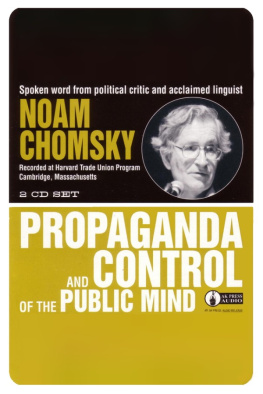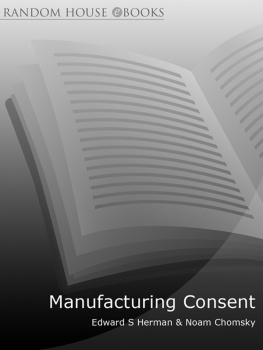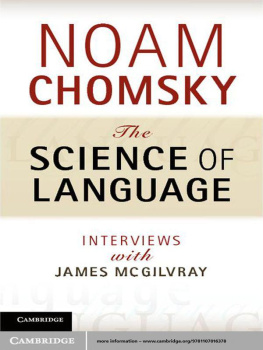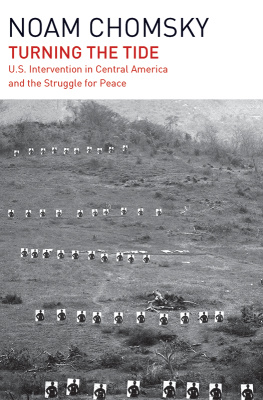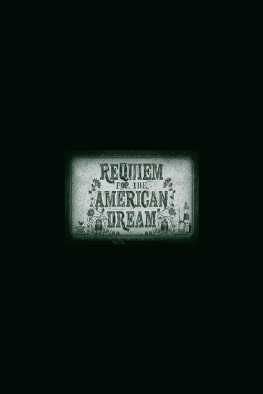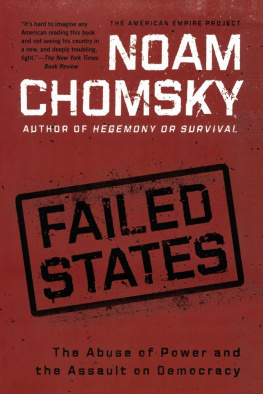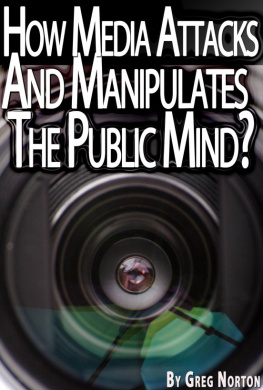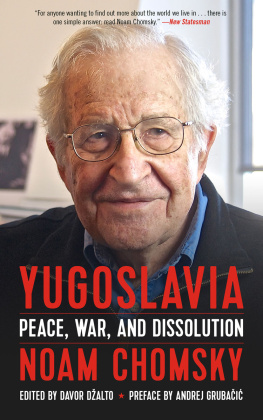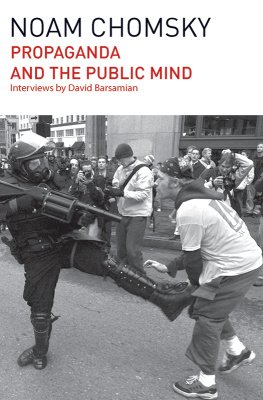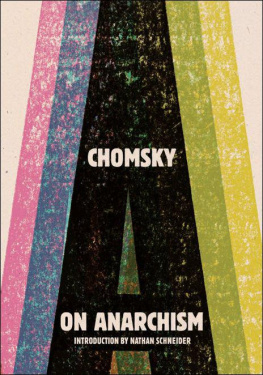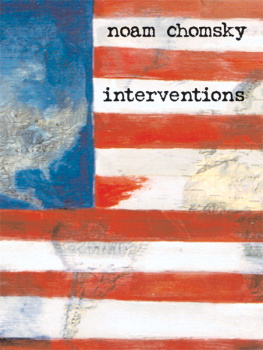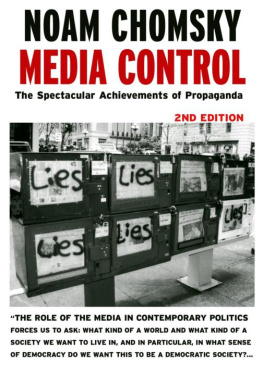Propaganda and Control of the Public Mind
Noam Chomsky
First published in 2001, Propaganda and Control of the Public Mind constitutes a lecture given at The Harvard Trade Union Program, Cambridge, Massachusetts on February 7, 1997, and is the perfect complement to Chomsky's major works of media study such as Manufacturing Consent and Necessary llusions.
This lecture, and the question and-answer session that follows, provide and introduction to (and synthesis of) Chomsky's key thinking on the media and propaganda, and their pivotal role in the relentless class struggle being waged daily.
Recorded live at The Harvard Trade Union Program, Cambridge, Massachusetts on February 7, 1997
Contents:
. A Real War
. Controlling The Public Mind
. Propaganda
. The Public Relations Industry
. Conscious Manipulation
. Labor Under Attack
. The Fate Of Democracy
. The Minority Of Opulent
. Regimentation
. Hysteria Among The Masters
. Americanism
. Mohawk Valley Formula
. Marginalization
. CIA Intervention
. Free Trade
. Welfare For The Rich
. Delusion
. Indoctrination
. Labor Struggles
. Authoritarian Structures
. Demonizing Labor
. Selling Free Enterprise
. Conspiracy Theories
. The Crisis Of Democracy
. Cuba And The U S
. Solutions
. Reshaping The Legal System
. Private Tyrannies
. Role Of The Media
. Poor People Pay
. The Country Is Flooded With Money
. Privatization
. Business Run Society
. Enlightenment Principles
. The Cold War
. Islam As The Enemy
. A Real War
It should be understood to be what it is - a real war. And it's not a new war, its an old war. Furthermore, its a class-conscious war, everywhere, but, specifically in the United States, where there happens to be a very free country, but which happens to have a highly class-conscious business-class, and always has. And it's very free and open, so youve got a lot of information about it. They talk, you have the records, and they have long seen themselves as fighting a bitter class war, except that they dont allow anybody else to know about it. Occasionally someone else gets the news. Rather famous case, which I'm sure you know, was Doug Fraser about 20 years ago, 1978, I think, when he pulled out a labor-management council and condemned business leaders for words were roughly like this for "having decided to fight a one-sided class war against working people", the poor, the unemployed, minorities, even members of the middle class, and for ''having torn up the fragile social compact that had been achieved during periods of growth and prosperity''. In fact these have been achieved primarily through rather militant struggle, very militant struggle, under harsh conditions, back in the 1930s. Now, the only thing wrong with this statement is that it was way too late. In fact, that war, that he's talking about, was initiated as soon as the ''fragile social compact'' was established, back in the 1930s, and very openly. You dont have to go to the secret records to find out about it, nor did you have to be at the wrong end of the clubs when the strikes were broken up in the late 30s to know about it, - it was completely public. The reason it's not well known is because neither the educational system nor scholarship, like Harvard, and so on, pay any attention to it, it's not a topic that's studied.
. Controlling The Public Mind
So, there's no doubt that one of the major issues of the 20th-century history, surely in the United States, is corporate propaganda. That's a huge industry, in fact, it extends over the, obviously, the commercial media, but also the whole range of the systems that reach the public: the entertainment industry, television, a good bit of what appears in schools, a lot of what appears in the newspapers, and so on. Huge amount of that comes straight out of the public relations industry, which was established in this country early in the century, and developed in the 20s and on. It has become an enormous industry: its now spreading over the rest of the world, but its primarily here, and it's goal from the beginning, perfectly openly and consciously, was to "control the public mind", as they put it. And the reason was that the public mind was seen as the greatest threat to corporations - that's from early in the century. Business power is strong, but its a very free country by comparative standards, and its hard to call on state violence, not impossible, but hard to call upon state violence to crush people's efforts to achieve freedom, and the rights, and justice. So, therefore, it was recognized early on that it's gonna be necessary to control people's minds. I should say that's not a new insight either you can read it in David Hume, and the Enlightenment authors already recognized what might be called the earliest stirrings of democratic revolutions in England in the 17th-century. There already was a concern that they will not gonna be able to control people by force, and we therefore have to control them by the means of controlling what they think, what they feel, their attitudes or attitudes toward one another, - all sorts of mechanisms of control are gonna have to be devised, which will replace the efficient use of force and violence, that was available for much greater extent, earlier on, and which has, fortunately, been declining, although not uniformly, but declining through the years, particularly here, leading to the need for other methods of control.
. Propaganda
You don't have to move very far from the Cambridge elite to learn about it. The major leading figure of the public relations industry is a highly regarded Cambridge liberal, the Roosevelt-Kennedy liberal, who died recently, Edward Bernays, who wrote the standard manual of the public relations industry back in the 1920s, which is very much worth reading. Remember, I'm not talking about the right wing here, this is wa-a-ay at the left liberal end in American politics. His book is called "On propaganda", or maybe just "Propaganda". I should mention that terminology changed during the WW2. Prior to the WW2 the term ''propaganda'' was used quite openly and freely for controlling the public mind. It got bad connotation strings during the WW2 because, you know, Hitler, and that sort of things, so the term was dropped, and the other terms are used. But if you read literature in the social sciences and the public relations industry and so on, back in say 20s and the 30s, they describe what they're doing as ''propaganda''.
. The Public Relations Industry
This manual is for the rising public relations industry, and he opens by pointing out that the ''conscious manipulation of the organized habits and opinions of the masses is the central feature of a democratic society'', its the ''essence'' of democracy, as it is later pointed out. And he said ''we have the means to carry this out'', ''we have the means to regiment people's minds as efficiently, as armies regiment their bodies'', and we must do this. First of all, that's the essential feature of democracy, but also it's a way to maintain power structures and authority structures, wealth and so on, roughly the way it is. Its worth remembering something else that they usually don't teach you very much about in school, and that is a view back at the origins of the American society. It was founded on the principle that was stated very explicitly by the leading framer, James Madison, in a Constitutional convention, that the, as he put it, the primary responsibility of the government is ''to protect the minority of the opulent against the majority''. Madison recognized, he was a smart guy, that this was going to be a serious problem if the democratic system were established, if the people have the right to vote. He used England as his model. England was a model for democracy for everyone in those days, around 1780s. And he pointed out in the debates on the Constitutional convention (something which everybody ought to read in the third grade, in a free society, and this is the origins of our society), he pointed out that in England if they had the right to vote, which, fortunately, they didnt, he said, pretty soon you would find people calling for redistribution of property and for a tax on property rights, for what nowadays we call 'agrarian reform' (it was mostly an agricultural society, so he would use the term 'agrarian reform' which is basically the same thing). He said people would start to call for agrarian reform obviously, that's intolerable, and we have to protect our own society against that kind of 'injustice' by ensuring the rights of property prevail. He recognized the problem of what he was already concerned in the 1780s, of what he called ''the symptoms of a leveling spirit'', that the people are starting to fume that property ought to be more equitably distributed that's a danger. But, he said, that the danger is going to become much more severe overtime as more and more people are marginalized and dispossessed, and ''secretly yearn for a more more equal distribution of life's blessings''. Now, if those people get to vote we're gonna be in trouble, 'cos its gonna be very hard to protect the minority of the opulent against the majority, which is what the government is all about.

